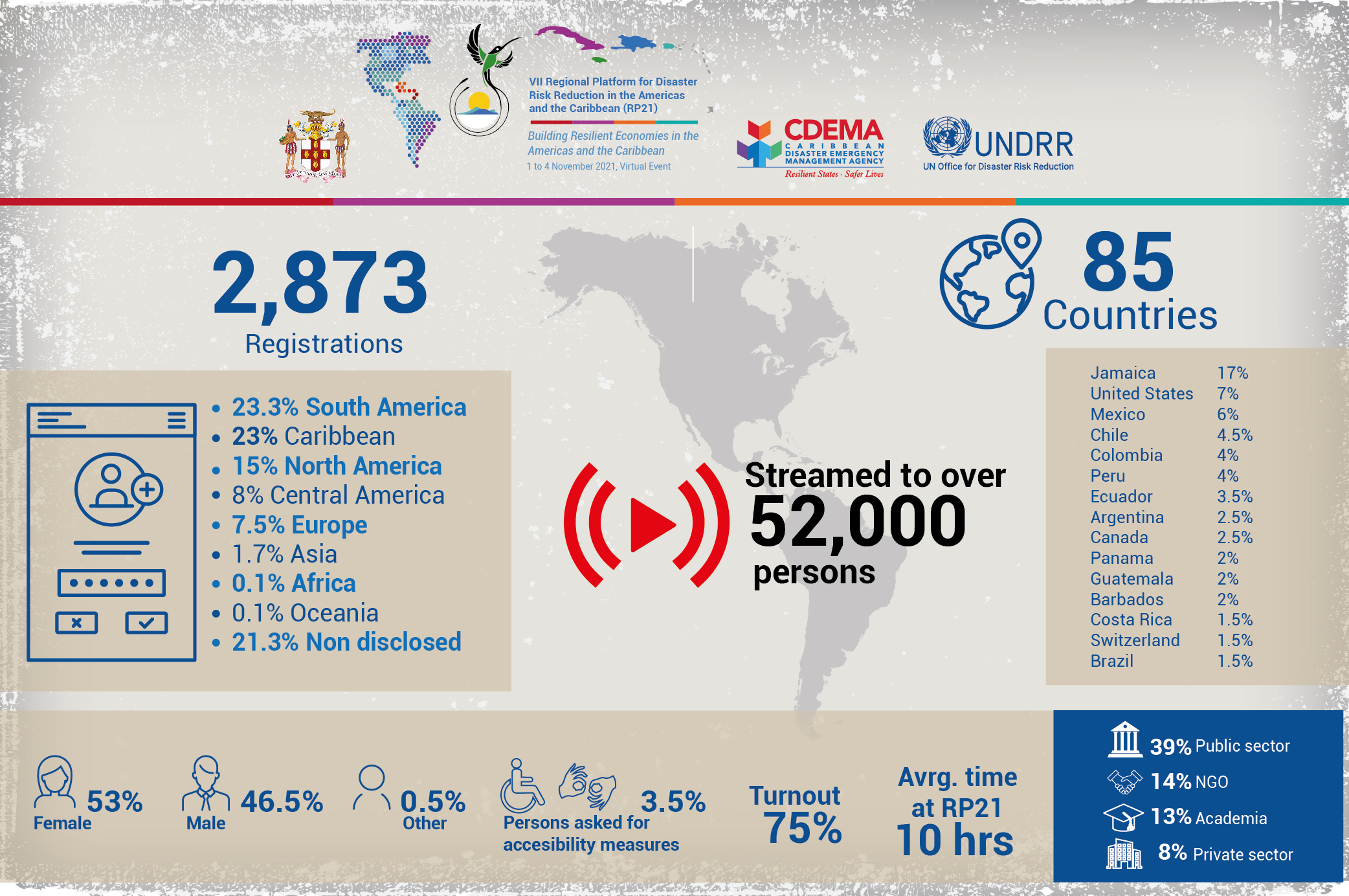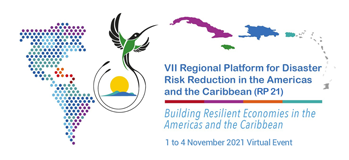
ORGANIZER(S)
- United Nations Office for Disaster Risk Reduction - Regional Office for Americas and Caribbean
- Government of Jamaica
- Caribbean Disaster Emergency Management Agency
REGIONAL PLATFORM FOR DISASTER RISK REDUCTION FOR THE AMERICAS AND THE CARIBBEAN
This seventh session of the Regional Platform has taken place at a pivotal time, as we look towards social and economic recovery from the COVID-19 pandemic, as countries convene at COP26 to define commitments with regards to the climate crisis, and as we look towards an increased cooperation and solidarity among countries to address the multiple risks that put growth and sustainable development in jeopardy.
The more than 30 sessions and the broad range of discussions that took place over these past four days brought together thousands of people from across the region who, by sharing their expertise, concerns, perspectives and ideas, contributed to making our region more resilient. From the Songhees and Esquimalt Nations in British Columbia, Canada, to the southern cone, over 2,500 people joined our bespoke digital platform and gave rise to a remarkable following on social media and on our website live stream – adding up to more than 35,000 views! – making this the most attended Regional Platform for Disaster Risk Reduction in the Americas & the Caribbean to date.
This event also broke other very significant records. This was indeed the first Regional Platform to be preceded by a Youth Forum for Disaster Risk Reduction, the first one to feature a representative from the youth at the opening ceremony, the first one to invite a representative of the youth to the Ministerial and High-Level Authorities Meeting, and the first one to end with concrete commitments to ensure the youth are part and parcel of our collective efforts to reduce disaster risk and build resilience. Building on the adage and the remarkable and continuous contributions of representatives of people with disabilities to the Regional Platform, Nothing about them without them!
Climate and disaster resilience require meaningful, transformative and inclusive cooperation with consideration for a multitude of social and economic factors, at all levels and with appropriate resourcing. Great emphasis was placed on the key role of women as leaders and key agents of change to build resilient development pathways. Since its onset, the COVID-19 pandemic has derailed development trajectories across the region. Similarly, social and economic inequalities have also been exacerbated. But the pandemic can also serve as a catalyst for human-rights based meaningful change as it has shown us the vital importance of collaboration and building alliances across critical sectors throughout the region. Opportunities for collaboration include strengthening data-sharing at country level and across the region, as well as increased provision of evidence-based scientific research and analyses for decision-making.
Countries of the region, informed by civil society and youth consultations, adopted a revised Regional Action Plan for the implementation of the Sendai Framework for Disaster Risk Reduction in the Americas & the Caribbean. A primary concern was to ensure that the Regional Action Plan integrated the systemic nature of risk and the lessons learned from the pandemic, including the need to strengthen risk governance and the articulation between disaster risk reduction and public health. Among the elements that were strengthened in this Plan are the linkages with social protection mechanisms to support the most vulnerable, the crucial role of the private sector in reducing disaster risk, the importance of ensuring access to basic services and the need to
strengthen the resilience of critical infrastructure. A special effort was made by all delegations to guarantee the inclusivity of the Regional Action Plan and ensure that no one is left behind.
A Ministerial and High-Level Authorities meeting, with representatives of 29 countries of the region, culminated with the adoption of a declaration that includes commitments on critical aspects that need to be addressed in the face of the complexity of the pandemic recovery, the climate challenge and the need for a higher ambition in the implementation of the Sendai Framework in tandem with the 2030 Agenda. Strengthening multi-sectorial, multi-stakeholder and multi-level risk governance and boosting the investments in building resilience become fundamental to achieve those goals. Social contracts that collectively manage risk are required, and these must be anchored in universal social protection systems. The Ministerial Meeting was attended by the Prime Minister of the Co-operative Republic of Guyana and other ten (10) Ministers of different countries, holding different portfolios, signalling the importance of these discussions for the social, political and economic future of our region.
The Ministerial Declaration, the Youth Declaration, the Civil Society Declaration, the adjusted Regional Action Plan, and a Chair Summary capturing only a snapshot of the rich discussions held during these four days can be found on the Regional Platform’s webpage.
In his opening remarks, the Most Honourable Andrew Holness, Prime Minister of Jamaica, called upon all nations in the region and on participants of this Regional Platform to reflect upon the measures needed to address the impacts of disasters and build resilient economies in the Americas and the Caribbean. We want to thank all participants, organizations, agencies, community leaders, speakers and particularly session organizing teams, for having responded to that call over these last four days and having contributed to making our societies more resilient.



